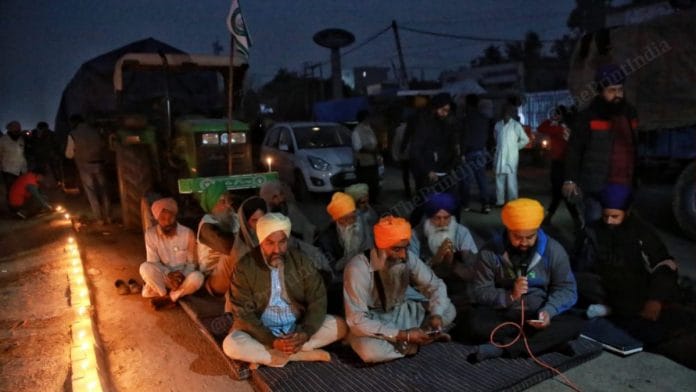Since the farmers’ movement hit the national stage in 2017, several political parties have shown solidarity with them. This is apparent in recent events such as chief ministers of different states fighting publicly over farmers’ issues. The Bharatiya Janata Party’s (BJP) allies in Punjab and Rajasthan have severed or are ready to sever their ties with the ruling coalition on farmers’ issues. Even the BJP, which previously used brute force against farmers in Haryana, Uttar Pradesh, and Madhya Pradesh, has changed its stance. Home Minister Amit Shah and Agriculture Minister Narendra Singh Tomar are uncharacteristically making efforts to reach out to farmer leaders.
Yet, farmer leaders are not convinced and have refrained from allying with political parties. They have rejected the offer made by Amit Shah and the several proposals put forward by the agricultural minister. Some farmer organisations have even refused to enter the State-designated protest site in Delhi and have instead decided to continue the blockade of Delhi-Haryana and Delhi-Uttar Pradesh borders. Contrary to Prime Minister Narendra Modi’s claims that the opposition is misleading farmers, media reports point that farmers have objected to opposition parties’ involvement in the protests.
The farmers’ rejection of political support despite being a politically weak and economically distressed group hints at a deep distrust that has developed over years of betrayal by politicians. Political parties make false promises during elections and show support when protests arise, but they provide little substantive representation to farmers.
Also read: When Modi govt came to power, farmer protests increased 700% — the 3 bills are its result
How political parties failed farmers
Even though the agrarian crisis has persisted for more than three decades, and nearly 50 per cent of India’s workforce relies on agriculture for livelihood, political parties have shown remarkably little interest in raising farmers’ issues in Parliament. Data collected by Saloni Bhogale on the questions asked in the Lok Sabha show that between 1999 and 2019 (13-16th Lok Sabha), of the total 2,98,292 questions asked, only 5 per cent (14,969) were directly related to farmers. When disaggregated party-wise, the same data shows that the two parties (the BJP and the Congress) that have ruled for ten years each during the said period have failed to put farmers’ issues on the legislative agenda. In the last 20 years, the average share of farmer-related questions asked by the BJP and the Congress was 5.6 per cent and 4.8 per cent.
The lack of interest in farmers’ issues is especially appalling because most major political parties claim to represent farmers across elections. They make promises in campaign rallies and plans in their manifestos. Furthermore, almost all major parties have farmer wings, for instance, the BJP has the Kisan Morcha and the Bharatiya Kisan Sangh (part of the RSS), and the Congress has the Kisan Congress. Yet, these political parties have failed to raise farmers’ issues, let alone provide comprehensive solutions. The free-loading and entitlement shown by the political parties, especially the BJP, is emblematic of what Mahavir Tyagi, a constituent assembly member, feared in 1948: “We have given the villager only the right of vote. And this too we have given him only to take back after every five years….”
Also read: Manmohan Singh blundered with Anna movement. Modi is making the same mistake with farmers
A crisis of trust
The opportunistic tendency of political parties to show solidarity only when farmers protest hits their credibility with the farmers, mainly because they rarely protest on farmers’ issues independently. Between January 2016 and August 2019, there were 377 petitions submitted by several political parties to protest at New Delhi’s Jantar Mantar. Of these, only 12 were on farmers’ issues. The Congress raised 110 of these 377 petitions but had farmer issues on their agenda only five times. Similarly, the BJP petitioned 63 times and had farmer issues only four times on their agenda. In contrast, farmer organisations petitioned to protest 225 times at Jantar Mantar, underscoring the severity of India’s agrarian crisis.
Having been repeatedly deceived by politicians’ false promises and self-serving displays of solidarity, a feeling of distrust has been stoked among farmers and led to fear of cooptation among their leaders. The farmers’ rejection of the State’s offers and the opposition’s support reflects this sense of betrayal and a demand for accountability. Going forward, the political parties need to address the focal question, who do they represent when they say they stand with farmers, and what are they willing to do for these farmers?
The author is a PhD student in Political Science at the University of California – Santa Barbara. Views are personal.







What should have been the right percentage of questions asked? And then should that also be broken down by caste, region, religion, gender etc etc? In how many ways do you advice us to divide our country?
How many of BJP ministers are farmers?
They are probably all basically RSS followers whose concern is only for Vedic culture, Muslims and Pakistan, not for farmers and labourers.
Farmers don’t pay any tax. Questions are asked by people who pay taxes for the right utilisation of their taxes.
Farmers feed the country . Without cheap food on your table you would not exist. India is one of the cheapest places in the world for food. Think about it.